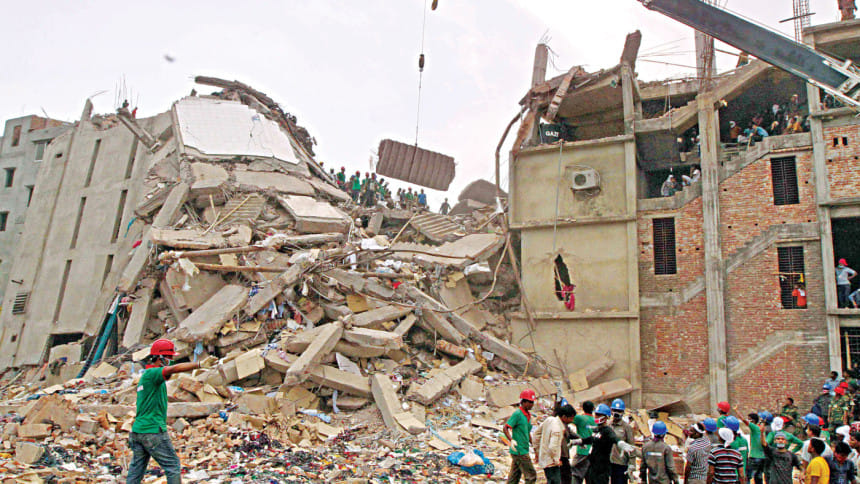Garment factories should go for gradual reopening: CPD

Garment factories should be reopened gradually after ensuring health and safety of workers because a long-term shutdown will hurt the economy, said an economist yesterday.
Bangladesh may lose its competitiveness in the international markets due to a lengthy production suspension as countries such as China and Vietnam have resumed their manufacturing lines.
All stakeholders should hold a dialogue on the matter, said Mustafizur Rahman, a distinguished fellow of the Centre for Policy Dialogue (CPD).
He spoke at a virtual discussion titled "7th Anniversary of Rana Plaza Tragedy: Crisis of Workers and Employers during the Coronavirus Pandemic - Government Initiatives and Way Forward", organised by the CPD.
The Rana Plaza building, which housed several garment factories, collapsed on April 24 in 2013, killing more than 1,134 people, mostly workers, and injuring another 2,500.
"Given the health emergency currently in place, factories need to continue with the holidays as per instructions of the government," said Khondaker Golam Moazzem, research director of the CPD, while presenting the keynote paper.
Most of the garment factories have kept their operations shut after the government enforced a countrywide lockdown from March 26 to curb the spread of the coronavirus infection. The lockdown has been extended to May 5.
Time has not come yet to say whether Bangladeshi garment sector would benefit in the post-coronavirus era and amid a bickering relationship between the US and China, Rahman said.
"If we can recover from the coronavirus and restart factory production, we will be able to maintain our competitiveness," he added.
The Bangladesh Garment Manufacturers and Exporters Association (BGMEA) is preparing a standard operating procedure such that the factories can resume production soon, said Arshad Jamal Dipu, vice-president of the trade body.
Factory management can follow health and safety rules inside the units. But workers might still catch the highly contagious virus on their way to work or at their residences even if the environment inside the factories improves.
The BGMEA has a plan to set up three coronavirus testing units and 130 private clinics in Gazipur for the workers once the units are reopened.
So far, 98.50 per cent of the workers have received the salary for March.
On the factory layoffs, Dipu said the BGMEA already suggested its members not choose that option. But the factories that suspended production temporarily will pay 60 per cent of the workers' gross salaries during the period, he added.
Although the safety situation has improved in the workplaces because of the efforts of the Accord and Alliance after the Rana Plaza building collapse, the long-term benefits of the victims have remained unaddressed, said Amirul Haque Amin, president of the National Garment Workers Federation.
Many garment factories are still in operation now in the name of producing personal protective equipment (PPE) and are producing other exportable goods despite the growing cases of coronavirus infections.
"This kind of factories should be identified and blacklisted, if necessary," Amin said, adding that 15 per cent factories did not pay the salary for March as of yesterday.
Some factory management are docking the workers' wages for the last five days of March, he said, adding that some are laying off their units although there is no scope for such action during general holidays.
During general holidays, workers should be allowed to go on leave with full salaries, Amin said.
Even seven years after the Rana Plaza tragedy, there has been little change in the rules on how garment factories run, Nazma Akter, president of the Sammilito Garment Sramik Federation.
There is no balance of power between trade unions and factory managements, Akter said, while demanding a halt on the layoffs.
She demanded reinstatement of the terminated garment workers and completion of wage payment for March as soon as possible.
The justice of Rana Plaza is yet to be served, said Joly Talukder, a leader of the Garment Workers Trade Union Centre.
An understanding has been reached at the International Labour Organisation on ensuring health and safety for garment workers once factories reopen, said Farooq Ahmed, secretary general of the Bangladesh Employers' Federation.
International retailers should come up with assistance to help local garment manufacturers, who alone can't provide all kinds of support to workers, Moazzem said.
"Every crisis gives a good lesson," said Fahmida Khatun, executive director of the CPD, while moderating the discussion.
For instance, Bangladesh improved compliance in the garment sector after the Rana Plaza building collapse. So, this coronavirus pandemic can also give a good lesson to Bangladesh."

 For all latest news, follow The Daily Star's Google News channel.
For all latest news, follow The Daily Star's Google News channel. 




Comments